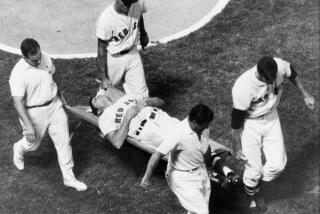Bush Winds Up and Delivers
The Duke of Wellington, recalling his final, decisive victory over Napoleon, declared, “The battle of Waterloo was won on the playing fields of Eton.” And while nothing was settled Tuesday night in Yankee Stadium when George W. Bush threw out the first ball, something was accomplished. The freshman president demonstrated what Wellington so admired: grace under pressure. Indeed, Bush showed the steadiness that his own father lacked, 15 Octobers ago.
Not unlike W., Wellington started out life as a rich kid. He was born Arthur Wellesley, son of an earl. He might have devoted his life to upper-class twittery but chose a military career instead.
Yet having attended Eton College, Wellington saw how the tough-minded, goal-oriented competition--and cooperation--of upper-class English schoolboys served to forge the steely officer corps that defeated the French Grande Armee.
OK, the duke was no populist, but he knew something about leadership, and he knew how to win a war.
And thus to Bush, rich kid turned strong man. The day after the attorney general declared a nationwide terrorist alert, as Vice President Dick Cheney was hidden away in a “secure location,” Bush took the highest possible profile; he traveled to New York City and strolled onto the pitcher’s mound.
It wasn’t risk-free, and it wasn’t easy, but there he stood. As he looked up at 57,000 cheering fans, knowing that tens of millions more were looking at him via TV, Bush surely thought of another baseball moment, involving himself and his father on Oct. 8, 1986. It’s a scene covered in excruciating detail in Richard Ben Cramer’s “What It Takes: The Way to the White House,” a detail-rich account of the 1988 presidential campaign.
It’s the ’86 National League playoffs, Astros hosting Mets. Live on ABC. Vice President George H. W. Bush, thinking he has wangled himself into a wonderful media op for his forthcoming presidential campaign, takes to the mound at the Astrodome. He winds and throws.
Throws what? Cramer describes Bush’s pathetic pitch as a “feckless parabola” that not only doesn’t get to the catcher, it doesn’t even get to the dirt around home plate. Instead, it bounces off the turf in the infield. As Cramer relates, “Bush twists his face into a mush of chagrin, hunches his shoulders like a boy who just dropped the cookie jar, and for one generous freeze-frame moment, buries his head in both hands.”
Of course, the elder Bush won the ’88 election anyway. But imagine if something like that had happened to the younger Bush on Tuesday night, when the stakes were so much higher. No wonder, people would have said, the U.S. is having a hard time in Afghanistan; its president can’t even throw a ball.
Yet Cramer offered an inside sidebar in his book. The younger Bush, the future 43rd president, was also in the Astrodome that night. And boy, was he mad. He had naturally wanted to be with his father but was instead assigned to a seat several rows back. To make it all the more humiliating, a vice presidential staffer had given himself a front-row spot, next to the old man.
But truth be told, the younger Bush wasn’t worth much back then. He was just a down-on-his-luck oil man. The transformation that led him to get on the wagon, get elected governor, get elected president had yet to occur.
But it did. And so, 15 years later, he was at Yankee Stadium, rallying the nation. He didn’t say anything, being content to let his actions speak for him.
He stood and delivered a perfect strike. As Peggy Noonan, speech writer to the elder Bush, said of the younger Bush’s performance, “It was only a metaphor, but it was a great metaphor. And metaphors only work if they are true.”
To be sure, there’s still a war to be won, but wars can never be won without national resolve. Happily for the United States, on the playing fields of the Bronx, President Bush threw the pitch of a lifetime.
More to Read
Go beyond the scoreboard
Get the latest on L.A.'s teams in the daily Sports Report newsletter.
You may occasionally receive promotional content from the Los Angeles Times.









